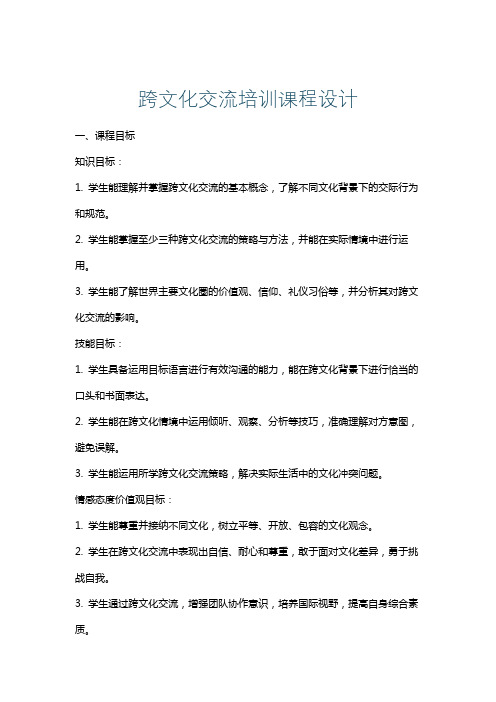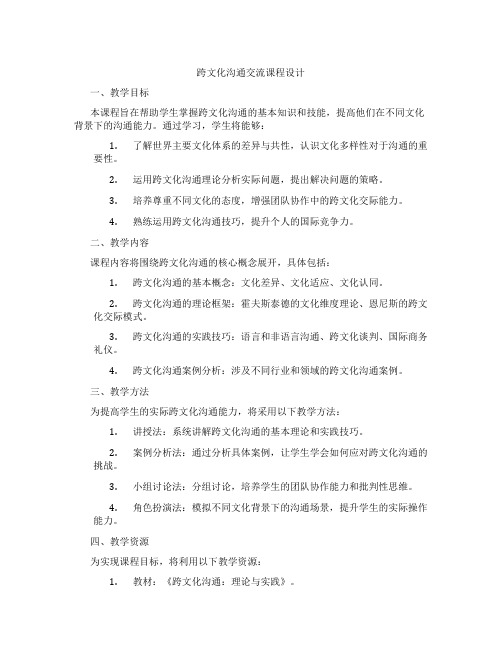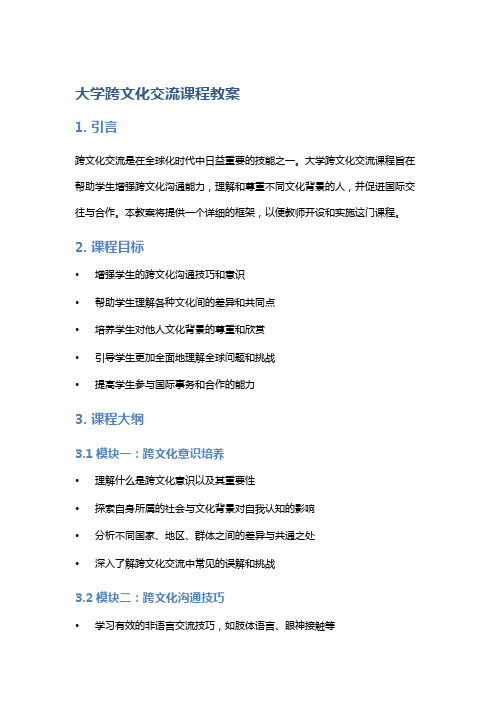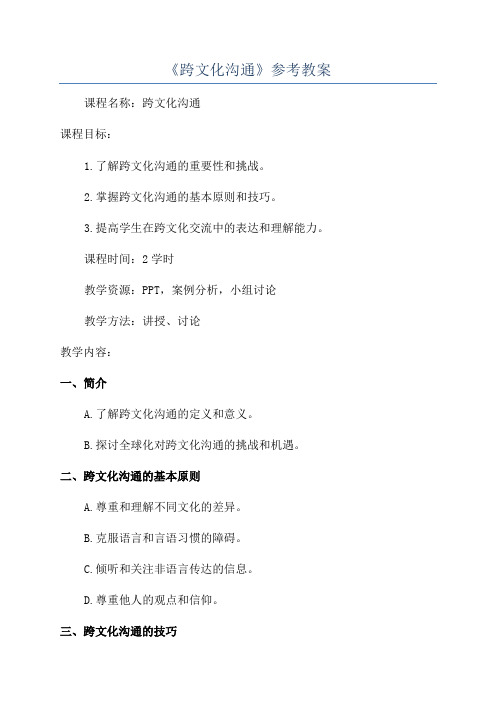清华大学跨文化课程教案5精品文档30页
跨文化交流优秀教案的跨文化教学设计

跨文化交流优秀教案的跨文化教学设计一、引言在当今全球化的世界里,跨文化交流越来越普遍,因此,跨文化教学与跨文化教育也变得尤为重要。
为了更好地培养学生的跨文化意识和跨文化交际能力,教师需要设计优秀的跨文化教学方案。
本教案旨在介绍一个具有跨文化教学设计的优秀教案。
二、背景在全球化背景下,跨文化教学不仅关注语言学习,更注重培养学生的跨文化交际能力和文化意识。
在实施跨文化教学时,教师需要根据学生的背景和需求,设计能够激发学生兴趣和积极参与的教学活动。
三、教学目标1. 了解不同文化背景下的交际模式和习俗;2. 培养学生的跨文化意识和敏感性;3. 提高学生的跨文化交际能力;4. 锻炼学生的批判性思维和解决问题的能力。
四、教学过程1. 引入活动首先,教师可以利用图片、视频或故事等资源,引入不同文化背景下的交际模式和习俗,激发学生对跨文化交流的兴趣。
2. 学习不同文化背景下的交际模式和习俗通过小组合作和讨论,学生们可以分享自己的文化背景,并了解其他同学的文化。
同时,教师可以通过案例分析和问题引导,帮助学生理解不同文化间的交际模式和习俗。
3. 进行跨文化交际活动教师可以设计一系列跨文化交际活动,如角色扮演、文化展览、文化对比等。
通过这些活动,学生们可以亲身体验跨文化交际的挑战和乐趣,提高他们的跨文化交际能力。
4. 分析和解决跨文化交际中的问题教师与学生一起分析和解决跨文化交际中的问题,培养学生的批判性思维和解决问题的能力。
教师可以提供真实案例,引导学生思考并提出解决方案,同时鼓励学生团队合作和创新思维。
五、评估方式教师可以采用多种评估方式,包括个人报告、小组项目展示、文化交际能力测试等。
评估的重点应该是学生对不同文化背景下交际模式和习俗的理解和应用能力。
六、教学资源与参考书目教师可以准备一些跨文化交际的教学资源,如图片、视频、故事和文化背景介绍等。
此外,教师还可以参考相关的跨文化教育理论与研究作品,以提高教学的质量和效果。
培养跨文化交流能力教案

培养跨文化交流能力教案教案:培养跨文化交流能力教案一、教学目标通过本课的学习,学生应能够:1. 了解跨文化交流的重要性;2. 掌握跨文化交流的基本技巧;3. 增强自己的跨文化适应能力;4. 培养尊重和理解不同文化的意识。
二、教学重点1. 跨文化交流的基本概念;2. 跨文化交流的必备技巧;3. 跨文化适应能力的培养。
三、教学准备1. PowerPoint演示稿;2. 学生手册和笔记。
四、教学过程Step 1 引入1. 向学生介绍跨文化交流的概念,并讨论它为什么重要。
2. 引导学生思考跨文化交流可能遇到的问题,并提出解决之道。
Step 2 跨文化交流的基本概念1. 通过PowerPoint演示,向学生介绍跨文化交流的基本概念,包括不同文化之间的差异、合作和交流的重要性等。
2. 提供一些真实的案例,让学生感受到跨文化交流的实际问题和挑战。
Step 3 跨文化交流的基本技巧1. 向学生介绍跨文化交流的基本技巧,包括尊重、注意非语言交流、适应不同的沟通风格等。
2. 引导学生讨论并总结出适应跨文化交流的具体技巧和策略。
Step 4 跨文化适应能力的培养1. 向学生介绍跨文化适应能力的重要性,并讨论如何培养这种能力。
2. 分组讨论,让学生分享自己在跨文化环境中的经验和感悟,并相互交流建议和解决问题的方法。
Step 5 案例分析与综合实践1. 提供一些跨文化交流案例,让学生分析并提出解决方案。
2. 分组演练跨文化交流场景,模拟实际情境,让学生应用所学技巧进行跨文化交流实践。
Step 6 总结与评价1. 对本节课所学内容进行总结,并与学生一起回顾重点。
2. 展示学生在跨文化交流实践中的表现,鼓励他们勇敢尝试并提出改进意见。
五、作业布置要求学生以跨文化交流为主题,撰写一篇500字的体验文章。
文章内容可以包括在实践中遇到的挑战、解决问题的方法以及感悟体会等。
六、课后反思通过对学生的观察和表现,评价本节课的教学效果,并思考如何进一步提升学生的跨文化交流能力。
跨文化教育教案

跨文化教育教案一、引言跨文化教育是指在多元文化背景下,促进不同文化间相互理解、认同和尊重的教育方式。
随着全球化的加深,跨文化教育变得越来越重要。
本教案旨在为教师制定一套有效的跨文化教育教案,以帮助学生增强跨文化意识和能力。
二、教学目标1. 培养学生对不同文化背景的尊重和理解能力;2. 培养学生的跨文化交流和合作能力;3. 增强学生对自身文化的认同和自信心;4. 培养学生的多元视角和全球意识。
三、教学内容1. 了解不同文化背景下的价值观和信仰;2. 学习跨文化交流的基本技巧;3. 探索自身文化背景和身份认同;4. 分析全球问题,培养全球意识。
四、教学策略1. 合作学习:鼓励学生进行小组合作,促进跨文化交流;2. 视觉辅助:使用图片、视频等教具,帮助学生感受不同文化;3. 角色扮演:让学生扮演不同文化背景的人物,模拟跨文化交流;4. 讨论引导:通过提问引导学生思考和探索。
五、教学步骤步骤一:介绍跨文化教育的概念和重要性(10分钟)教师简要介绍跨文化教育的背景和目标,鼓励学生思考多元文化的益处,并引导学生讨论在全球化时代如何应对不同文化之间的挑战。
步骤二:了解不同文化背景下的价值观和信仰(20分钟)教师通过展示不同国家和地区的文化特点,引导学生了解不同文化背景下的价值观和信仰。
学生可以以小组形式分享自己了解的文化,并对比不同文化之间的差异。
步骤三:学习跨文化交流的基本技巧(30分钟)教师向学生介绍跨文化交流的基本技巧,如尊重差异、保持开放心态、主动了解对方文化等。
通过角色扮演活动,让学生模拟跨文化交流场景,运用所学技巧进行交流。
步骤四:探索自身文化背景和身份认同(30分钟)教师引导学生思考自己的文化背景和身份认同,并鼓励学生在小组中分享自己的文化传统、价值观和习俗。
学生可以通过写作、绘画等方式表达自己对文化的理解和认同。
步骤五:分析全球问题,培养全球意识(40分钟)教师提供一些全球问题,如气候变化、贫富差距等,引导学生通过全球视野来思考和分析这些问题,并帮助学生意识到个体的行动对全球产生的影响。
大学:促进学生跨文化交流的教案

大学:促进学生跨文化交流的教案1. 引言在如今日益全球化的社会中,跨文化交流的重要性与日俱增。
大学作为培养高素质人才的重要阶段,应该重视并积极推动学生之间的跨文化交流。
本教案将介绍一种有效的方法来促进大学生的跨文化交流,旨在帮助他们增强对不同文化背景下的理解和尊重。
2. 目标通过该教案实施,我们希望达到以下目标: - 增强学生对不同文化间差异性的认识和理解; - 促进学生在跨文化环境下进行有效沟通和合作; - 培养学生具备全球视野和国际竞争力。
3. 教案内容及活动设计3.1 文化分享讲座组织不同国家或地区的留学生或专家进行文化分享讲座,邀请他们介绍自己国家或地区特色、传统和习俗等。
这既可以提供给本土学生了解其他国家/地区的机会,也能让留学生有机会展示自己的文化。
3.2 跨文化交流小组将学生分成跨文化小组,每个小组由来自不同国家或地区的学生组成。
通过一系列任务和项目,促使他们共同合作、互动并了解彼此文化。
3.3 跨文化论坛活动举办跨文化论坛活动,邀请代表不同国家或地区的学生进行主题演讲或座谈,让更多的学生参与其中。
通过讨论和交流,提高学生对全球事务的认识,并鼓励他们发表自己的观点和意见。
3.4 文化体验活动组织学生参与各种跨文化体验活动,如制作传统艺术品、品尝异国美食、学习外语歌曲等。
这些活动能够帮助学生更深入地了解其他文化,并培养他们的兴趣和喜好。
4. 教案实施过程4.1 教师角色•指导者:教师应指导学生在跨文化交流中遇到问题时寻求解决方案。
•观察者:教师要时刻观察学生在交流中存在的问题,并及时给予指导。
•记录者:教师应记录学生在跨文化交流中的发展和进步。
4.2 学生角色•学习者:学生负责参与并积极学习跨文化交流知识和技巧。
•合作者:学生应与其他同学合作,建立积极的团队关系,并共同完成项目任务。
•探索者:学生应主动去探索和了解不同文化背景下的差异、共性和挑战。
4.3 实施步骤•针对每个活动设计详细的计划,包括时间安排、任务分配等。
跨文化交流培训课程设计

跨文化交流培训课程设计一、课程目标知识目标:1. 学生能理解并掌握跨文化交流的基本概念,了解不同文化背景下的交际行为和规范。
2. 学生能掌握至少三种跨文化交流的策略与方法,并能在实际情境中进行运用。
3. 学生能了解世界主要文化圈的价值观、信仰、礼仪习俗等,并分析其对跨文化交流的影响。
技能目标:1. 学生具备运用目标语言进行有效沟通的能力,能在跨文化背景下进行恰当的口头和书面表达。
2. 学生能在跨文化情境中运用倾听、观察、分析等技巧,准确理解对方意图,避免误解。
3. 学生能运用所学跨文化交流策略,解决实际生活中的文化冲突问题。
情感态度价值观目标:1. 学生能尊重并接纳不同文化,树立平等、开放、包容的文化观念。
2. 学生在跨文化交流中表现出自信、耐心和尊重,敢于面对文化差异,勇于挑战自我。
3. 学生通过跨文化交流,增强团队协作意识,培养国际视野,提高自身综合素质。
本课程针对的学生群体为具有一定语言基础和交际能力的高中生,课程性质为实践性、互动性强的跨文化交流培训。
在教学过程中,教师需关注学生的个体差异,充分调动学生的积极性,引导他们主动参与课堂活动。
课程目标的设定旨在使学生在掌握跨文化交流知识的基础上,提高实际沟通能力,培养良好的情感态度价值观,为未来的国际交流与合作打下坚实基础。
二、教学内容本课程教学内容主要包括以下三个方面:1. 跨文化交流基本概念与原则- 文化差异对交流的影响- 跨文化交流的定义与特点- 跨文化交流的基本原则2. 跨文化交流策略与方法- 非语言交际技巧:肢体语言、面部表情等- 语言交际技巧:语速、语调、礼貌用语等- 文化适应策略:尊重、同理心、开放性等3. 世界主要文化圈概述- 亚洲文化:中国、日本、印度等- 欧洲文化:英国、法国、德国等- 美洲文化:美国、巴西、加拿大等- 非洲文化:埃及、南非、尼日利亚等教学大纲安排如下:第一周:跨文化交流基本概念与原则第二周:非语言交际技巧第三周:语言交际技巧第四周:文化适应策略第五周:亚洲文化概述第六周:欧洲文化概述第七周:美洲文化概述第八周:非洲文化概述教学内容与教材紧密关联,确保学生能够系统地学习和掌握跨文化交流的知识与技能。
跨文化沟通交流课程设计

跨文化沟通交流课程设计一、教学目标本课程旨在帮助学生掌握跨文化沟通的基本知识和技能,提高他们在不同文化背景下的沟通能力。
通过学习,学生将能够:1.了解世界主要文化体系的差异与共性,认识文化多样性对于沟通的重要性。
2.运用跨文化沟通理论分析实际问题,提出解决问题的策略。
3.培养尊重不同文化的态度,增强团队协作中的跨文化交际能力。
4.熟练运用跨文化沟通技巧,提升个人的国际竞争力。
二、教学内容课程内容将围绕跨文化沟通的核心概念展开,具体包括:1.跨文化沟通的基本概念:文化差异、文化适应、文化认同。
2.跨文化沟通的理论框架:霍夫斯泰德的文化维度理论、恩尼斯的跨文化交际模式。
3.跨文化沟通的实践技巧:语言和非语言沟通、跨文化谈判、国际商务礼仪。
4.跨文化沟通案例分析:涉及不同行业和领域的跨文化沟通案例。
三、教学方法为提高学生的实际跨文化沟通能力,将采用以下教学方法:1.讲授法:系统讲解跨文化沟通的基本理论和实践技巧。
2.案例分析法:通过分析具体案例,让学生学会如何应对跨文化沟通的挑战。
3.小组讨论法:分组讨论,培养学生的团队协作能力和批判性思维。
4.角色扮演法:模拟不同文化背景下的沟通场景,提升学生的实际操作能力。
四、教学资源为实现课程目标,将利用以下教学资源:1.教材:《跨文化沟通:理论与实践》。
2.参考书籍:提供相关领域的经典和最新著作,供学生深入阅读。
3.多媒体资料:收集相关的视频、音频和网络资源,丰富教学手段。
4.实验设备:如需的话,安排实验室练习,让学生在实践中学习跨文化沟通。
五、教学评估为全面评估学生的学习成果,本课程将采用以下评估方式:1.平时表现:通过课堂参与、提问和小组讨论等方式,评估学生的积极性和主动性。
2.作业:布置相关的写作和研究报告,评估学生对课程内容的理解和应用能力。
3.考试:期末进行闭卷考试,评估学生对跨文化沟通知识的掌握程度。
4.跨文化沟通能力展示:学生进行角色扮演或案例分析展示,评估他们的实际沟通能力。
《跨文化沟通》教案

《跨文化沟通》教案教案:跨文化沟通一、教学目标:1.了解跨文化沟通的概念和重要性;2.掌握跨文化沟通中的常见障碍和解决方法;3.培养学生的跨文化意识和沟通能力。
二、教学内容:1.跨文化沟通的概念和重要性;2.跨文化沟通中的常见障碍;3.跨文化沟通中的解决方法;4.跨文化沟通的案例分析。
三、教学过程:1.预习导入:通过观看一段跨文化沟通失败的视频,引发学生对跨文化沟通的重要性和困难的思考。
2.理论讲解:a.跨文化沟通的概念和重要性:介绍跨文化沟通的定义和意义,让学生了解跨文化沟通与日常沟通的区别。
b.跨文化沟通中的常见障碍:介绍语言、文化差异、身体语言等在跨文化沟通中常见的障碍,通过讨论学生的经历和观察,让学生深入了解跨文化沟通的困难。
c.跨文化沟通中的解决方法:介绍学习对方语言和文化、尊重和理解对方、提前做好准备等解决方法,通过案例分析和讨论让学生掌握这些解决方法的应用。
3.案例分析:a.教师给出几个跨文化沟通的案例,并组织学生进行分析和讨论,让学生体会到跨文化沟通中的难题和解决方法的实用性。
b.学生分组讨论自己在跨文化沟通中遇到的难题和解决方法,并向全班汇报,进行互动和交流。
4.总结和评价:a.教师对本次课程进行总结,强调跨文化沟通的重要性,并展望下一次课程的内容。
b.学生对本堂课进行评价和反馈,提出自己的问题和建议。
四、教学方法:1.案例分析法:通过真实的案例让学生理解和分析跨文化沟通中的问题和解决方法,增强学生的实际操作能力。
2.合作学习法:通过分组讨论和互动,培养学生的合作和团队精神,增强学生之间的互动和交流。
3.观察法:教师通过观察学生的表现和讨论,了解学生对跨文化沟通的理解和掌握程度,并及时进行调整和指导。
五、教学评价:1.学生的参与度和表现情况:观察学生在案例分析和讨论中的表现和参与度,看是否能够积极提出观点和解决方法。
2.学生的讨论和汇报情况:评价学生在分组讨论和汇报中的表现,看是否能够清晰地表达观点并与他人进行有效的交流。
引导大学生跨文化交流的教案

引导大学生跨文化交流的教案一、引言本文档旨在提供一份教案,帮助大学生更好地进行跨文化交流。
随着全球化的进程,跨文化交流能力已成为现代社会越来越重要的技能之一。
通过本教案的实施,希望培养学生们在不同文化背景下进行有效沟通和合作的能力。
二、目标1.帮助学生了解和尊重不同文化差异。
2.提高学生的跨文化沟通和适应能力。
3.培养学生具有开放心态,愿意接触并理解其他文化。
4.培养跨文化合作与协商技巧。
三、教案内容步骤一:培养跨文化意识•介绍不同国家和地区的文化特点,包括语言、宗教、风俗习惯等方面。
•组织讨论,让学生们分享自己对其他文化的认知和偏见,并加以解决。
步骤二:提高跨文化沟通技巧•探讨非语言沟通方式在不同文化中的差异和重要性。
•分析常见的跨文化沟通挑战,并提供解决方案,如尊重他人观点、倾听和掌握基本礼仪等。
步骤三:培养开放心态与包容力•鼓励学生们主动参与不同文化活动,如语言交换会、国际社团等。
•引导学生反思自己的文化观念和偏见,并学习欣赏其他文化之美。
步骤四:训练跨文化合作与协商技巧•组织模拟跨文化合作场景,让学生们感受到在团队合作中不同文化间的碰撞和融合。
•提供教材或案例研究,帮助学生们理解并应对跨文化冲突。
四、教学方法1.创设多元环境:组建国际交流小组,邀请外籍教师或志愿者来校交流经验。
2.活动实践:组织实地考察、游戏互动等形式,加深学生对不同文化的体验。
3.视频资源利用:引入相关视频、纪录片等素材,观看和讨论。
五、教学评估1.检查学生对不同文化差异的了解程度。
2.评估学生在跨文化沟通情境中的表现,包括语言运用、姿态等。
3.分析学生参与跨文化合作活动的积极性和成果。
六、结语本教案旨在引导大学生们更好地进行跨文化交流,并提高他们的跨文化意识和沟通技巧。
通过多元的教学方法和实践活动,希望能够帮助学生们逐步培养开放的心态和包容力,为未来在全球化社会中取得成功打下坚实基础。
《跨文化沟通》参考教案

《跨文化沟通》课程教案(供教师参考)全书共3部分,12课:跨文化基本概念、跨文化技能、跨文化应用教学目的:培养学生全球视野、跨文化思维、跨文化适应与沟通能力:教学理念与方法:1、项目导向、案例分析+任务驱动三合一教学法 (案例分析、直面现实、展望未来)案例分析(What's wrong, Intercultural case study)引导学生分析案例:先问该案例文化冲突点,然后对此展开跨文化分析,最后提出解决方案以及如何避免类似的跨文化冲突。
案例分析之后,教师引导学生思考现实社会中的种种跨文化问题,直面现实社会中的跨文化问题,培养学生发现问题、分析问题、解决实际问题的能力。
这些现实社会中的跨文化问题,需要教师积极引导,让学生思考,最后可以由教师提出,组织学生参与讨论。
目的:培养学生积极参与讨论意识、鼓励学生主动表达、发表各自观点。
教师不做否定学生观点评论,但鼓励学生阐述为何这样分析,注意,教师应该多鼓励学生,即使其观点不十分到位,因为分析案例不是仅仅为了达到解决案例的目的,而是通过案例分析的过程,培养学生参与讨论、发表观点甚至不同观点的意识与积极性。
课文(阅读一为主)课文后的问题都是开放式的问题,可以鼓励学生自由发挥,畅所欲言。
教师可聚焦课文中的跨文化要点而非语言点。
教师可先问学生本课文的跨文化要点,之后教师可做些解释、分析与补充。
跨文化视角这是跨文化沟通教程的重点,也是培养学生跨文化思维的路径,教师可以做些讲解与说明,强调这些是学生今后用于跨文化问题分析的视角。
跨文化项目(问题导向)让学生以团队形式完成每一单元之后的跨文化项目,培养学生学以致用的能力,同时也培养学生团队合作能力,培养学生未来职场竞争力。
这一教学过程体现教学理念:培养学生直面现实问题,分析与解决现实问题的能力,这也是评估学生学习效果。
考试建议考试的目的是检查学生学习本课程之后是否已理解与掌握了有关知识与能力,建议考试以写课程论文为主,并用中文写,可以让学生自由选择课程论文的题目,3人一组团队完成论文。
大学跨文化交流课程教案

大学跨文化交流课程教案1. 引言跨文化交流是在全球化时代中日益重要的技能之一。
大学跨文化交流课程旨在帮助学生增强跨文化沟通能力,理解和尊重不同文化背景的人,并促进国际交往与合作。
本教案将提供一个详细的框架,以便教师开设和实施这门课程。
2. 课程目标•增强学生的跨文化沟通技巧和意识•帮助学生理解各种文化间的差异和共同点•培养学生对他人文化背景的尊重和欣赏•引导学生更加全面地理解全球问题和挑战•提高学生参与国际事务和合作的能力3. 课程大纲3.1 模块一:跨文化意识培养•理解什么是跨文化意识以及其重要性•探索自身所属的社会与文化背景对自我认知的影响•分析不同国家、地区、群体之间的差异与共通之处•深入了解跨文化交流中常见的误解和挑战3.2 模块二:跨文化沟通技巧•学习有效的非语言交流技巧,如肢体语言、眼神接触等•掌握合适的礼仪与行为准则•学习如何正确使用隐喻、谚语和比喻等文化特定的表达方式•培养灵活性和适应能力以应对不同文化背景下的沟通难题3.3 模块三:文化差异与共同点分析•研究不同文化背景下的价值观、信仰体系和社会习俗•分析不同文化对时间、个人空间、权力结构等方面的理解和处理方式的差异•探索全球主要文化社群之间的相似之处,从而建立联系和互信3.4 模块四:跨文化问题和挑战•研讨全球性问题,如多元社会中的种族歧视、性别平等、环境保护等议题•分析当今世界面临的移民、国际贸易和政治争端等跨文化挑战•引导学生探索如何通过跨文化合作和理解来解决这些问题3.5 模块五:实践项目•学生分组完成一个真实的跨文化项目,例如组织国际文化节或参与志愿者服务等•提供指导和支持,鼓励学生应用他们在课堂上学到的知识和技能•写出项目总结报告,并让学生分享他们在项目中的经验和收获4. 教学方法与评估方式•教学方法:讲座、小组讨论、角色扮演、案例分析等•评估方式:课堂参与度、小组任务成果评估、个人反思日志、最终项目报告等多样化形式相结合5. 教材推荐•"Intercultural Communication: A Global Reader" by Larry Samovar and Richard E. Porter•"Cross-Cultural Connections: Stepping Out and Fitting In Around the World" by Duane Elmer•"Communicating Across Cultures" by Stella Ting-Toomey6. 结语大学跨文化交流课程的教案为教师提供了一个有力的工具,帮助学生掌握重要的跨文化沟通技能和思维方式。
《跨文化交流》教案

《跨文化交流》教案跨文化交流教案1. 教案简介本教案旨在帮助学生了解和研究跨文化交流的重要性和技巧。
通过教授相关的理论知识和实践活动,学生将能提高自己的跨文化交流能力,更好地适应多元文化环境。
2. 教学目标- 了解跨文化交流的定义和重要性;- 掌握基本的跨文化交际技巧;- 培养学生的开放心态和敏感性,增强与不同文化的人交流的能力。
3. 教学内容和流程第一课:跨文化交流的概念- 介绍跨文化交流的定义和背景;- 分享一些跨文化交流的案例,引发学生的兴趣;- 引导学生思考跨文化交流所面临的挑战和机遇。
第二课:跨文化交际技巧- 提供一些基本的跨文化交际技巧,如尊重差异、倾听和观察等;- 分组讨论和角色扮演活动,让学生实践这些技巧;- 引导学生思考如何解决跨文化交流中的冲突和误解。
第三课:培养开放心态和敏感性- 讨论多元文化的概念和重要性;- 分享一些案例,让学生理解不同文化之间的共同点和差异;- 引导学生尊重并接纳不同文化的观念和行为方式。
第四课:跨文化交流实践- 设计实践活动,如访谈外国留学生或观察不同文化的社交活动;- 学生根据实践经验反思和总结,分享他们的体验和感受;- 教师提供反馈和建议,帮助学生改进跨文化交流能力。
4. 评估方法- 学生小组讨论和角色扮演的表现;- 学生的实践活动报告和反思;- 学生之间的互动和交流。
5. 教学资源- 教材:跨文化交流教育指南;- 多媒体设备:投影仪、音频设备等;- 实践活动所需材料。
6. 参考文献以上是《跨文化交流》教案的内容和流程,希望能帮助学生提高跨文化交流能力,增进他们的跨文化理解和包容性。
关于跨文化交流的教案

关于跨文化交流的教案跨文化交流的教案引言随着全球化的趋势加速,不同国家之间的交流和合作变得越来越普遍。
尤其是在商业和教育领域,跨文化交流已经成为了关键的组成部分。
然而,跨文化交流也面临着许多挑战和机遇。
本教案将重点介绍如何培养学生的跨文化交流能力。
一、课程目标通过此课程的学习,学生将能够:1. 了解跨文化交流的基本概念和挑战。
2. 掌握跨文化交流的基本技巧和策略。
3. 增强自己的跨文化交流能力,并能够在实际场景中运用所学知识与技能。
二、教学过程1. 导入学生打开电脑,进入教师提供的在线课程平台。
教师简单介绍今天的课程,引出跨文化交流的概念,并让学生自由讨论这个话题,分享自己的看法和经验。
2. 基础知识讲解教师通过PPT演示介绍跨文化交流的基本概念、挑战和必备技能。
如:(1)文化差异的概念和影响;(2)语言交流中的误解和解决方法;(3)身体语言与文化差异;(4)尊重他人和差异的原则;(5)适应当地的言行举止。
教师要注意与学生互动,引导学生思考和参与讨论。
3. 实操演练教师利用多媒体工具,设计并呈现一些跨文化交流场景,如接待外宾、跟本地人交流等等。
学生可以自由地发挥自己的想象,模拟出实际的情境,并进行交流。
每个学生都应该有机会参与,教师可以根据需求分组或者个别提供指导。
4. 总结反馈课程结束前,教师对今天的教学过程和学生的表现进行总结和反馈。
同时,也鼓励学生留下自己的思考和感受,促进学生自主学习和思考。
三、教学评估评估方式:学生自评、互评、教师评估评估标准:1. 学习过程中是否认真参与。
2. 跨文化交流能力的提升。
3. 能否在实际情境下灵活运用所学知识和技能。
四、参考资料1. Zhou, X. (2017). Intercultural communication for global business: How leaders communicate for success. Springer.2. Jandt, F. E. (2019). An introduction to intercultural communication: Identities in a global community. Sage Publications.3. Gudykunst, W. B., & Kim, Y. Y. (Eds.). (2020). Theories in intercultural communication. Sage Publications.。
培养学生跨文化交流能力的教案

培养学生跨文化交流能力的教案教学目标:1. 帮助学生了解跨文化交流的重要性和必要性;2. 提供学生获取和理解不同文化信息的能力;3. 发展学生在跨文化交流中的沟通和合作技能;4. 提高学生的文化包容性和信任度。
教学准备:1. 针对不同文化背景的资料和案例分析;2. PPT或其他多媒体工具;3. 与不同文化背景学生互动的任务和活动;4. 团队合作的实践课程。
教学步骤:第一步:导入使用一段引人入胜的视频或音频让学生了解跨文化交流的重要性和必要性。
可以通过展示不同国家的音乐、音乐、文化习俗、节日等吸引学生的注意。
第二步:理论讲解1. 解释跨文化交流的定义和意义,并列举一些跨文化交流的实际案例,让学生更容易理解概念。
2. 分析跨文化交流的挑战和障碍,如语言障碍、文化误解等。
第三步:培养获取不同文化信息的能力1. 将学生分为小组,每个小组选择一个国家或地区进行深入研究。
2. 学生使用各种资源(图书馆、互联网等)收集关于该国家或地区的信息,包括历史、文化、宗教、风俗习惯等。
3. 每个小组向全班展示他们的研究结果,让其他学生了解不同文化的特点和价值观。
第四步:培养跨文化沟通和合作技能1. 设计角色扮演任务,让学生在不同文化背景下进行沟通和合作。
2. 学生需要互相了解对方的文化背景,并尝试克服沟通障碍。
3. 教师可以提供一些建议和技巧,帮助学生更好地进行跨文化交流。
第五步:发展文化包容性和信任度1. 组织跨文化交流活动,如国际食品节或文化展览。
2. 学生可以自愿参与,展示自己的国家或地区的文化特色和传统。
3. 学生之间互相交流,分享和学习其他文化的经验。
第六步:总结和讨论1. 整理跨文化交流所遇到的问题和挑战,并讨论如何解决这些问题的方法和策略。
2. 强调学生在跨文化交流中的成长和收获,并鼓励他们继续发展跨文化交流能力。
教学评估:教师可以通过以下方式评估学生的跨文化交流能力:1. 观察学生在小组讨论和角色扮演任务中的表现;2. 评价学生对不同文化信息的理解和应用能力;3. 检查学生在跨文化交流活动中的参与程度和效果;4. 考察学生对跨文化交流难题的解决方案的创造性思维。
跨文化课程设计

跨文化课程设计一、教学目标本课程旨在帮助学生掌握跨文化沟通的基本知识和技能,提高他们在多元文化环境下的交流与合作能力。
具体目标如下:1.了解世界各国文化的基本特点和差异。
2.掌握跨文化沟通的基本理论和方法。
3.熟悉国际礼仪和跨文化商务沟通策略。
4.能够运用跨文化沟通技巧进行有效交流。
5.具备分析跨文化情境下的沟通问题的能力。
6.学会制定和实施跨文化团队合作策略。
情感态度价值观目标:1.培养对不同文化的尊重和理解。
2.增强团队协作精神和跨文化同理心。
3.树立正确的跨文化沟通观念,提高跨文化竞争力。
二、教学内容本课程的教学内容主要包括以下几个部分:1.跨文化沟通的基本概念:文化差异、文化冲击、跨文化交际等。
2.跨文化沟通的理论:霍夫斯泰德文化维度理论、跨文化沟通模型等。
3.跨文化沟通技巧:非语言沟通、跨文化商务沟通、冲突管理等。
4.跨文化情境下的沟通实践:国际商务谈判、跨文化团队协作等。
5.跨文化礼仪和习俗:世界各国礼仪、商务礼仪、跨文化敏感性问题等。
三、教学方法为了提高教学效果,本课程将采用多种教学方法相结合的方式,包括:1.讲授法:讲解跨文化沟通的基本理论和知识。
2.案例分析法:分析典型跨文化沟通案例,提高学生的问题解决能力。
3.小组讨论法:分组讨论,培养学生的团队协作和沟通能力。
4.角色扮演法:模拟跨文化沟通情境,提高学生的实际操作能力。
5.实验法:通过实验室模拟,让学生在实践中掌握跨文化沟通技巧。
四、教学资源为了支持本课程的教学,我们将准备以下教学资源:1.教材:《跨文化沟通与管理》、《国际礼仪与跨文化商务沟通》等。
2.参考书:提供相关领域的书籍,供学生拓展阅读。
3.多媒体资料:制作课件、教学视频等,丰富教学手段。
4.实验设备:实验室设施,用于模拟跨文化沟通情境。
5.在线资源:利用网络资源,为学生提供更多的学习材料和案例。
五、教学评估本课程的评估方式包括平时表现、作业、考试等多个方面,以全面客观地评价学生的学习成果。
跨文化交流教案课程

跨文化交流教案课程介绍跨文化交流教案课程旨在帮助学生提高跨文化沟通能力,培养跨文化意识和解决跨文化冲突的技巧。
本教案包含丰富多样的教学活动和资源,让学生在研究中获得实际经验并提升自己的交流能力。
教学目标- 帮助学生理解跨文化交流的重要性和挑战- 提高学生的跨文化沟通和解决冲突的能力- 培养学生的跨文化意识和敏感性- 培养学生的自我反思和适应能力教学内容1. 跨文化意识培养- 探索不同文化的特点和价值观- 分析跨文化冲突的原因和解决方法- 研究如何尊重和欣赏不同文化2. 跨文化沟通技巧- 研究有效的跨文化沟通策略和技巧- 研究如何解读非语言交流和跨文化障碍- 实践跨文化交流技巧的活动3. 跨文化冲突解决- 研究分析和解决跨文化冲突的方法- 培养学生的冲突解决能力和谈判技巧- 进行跨文化冲突案例研究4. 跨文化实践体验- 组织学生参加跨文化实践活动,如文化交流活动、社区服务等- 学生分享和讨论实践体验,提高反思和适应能力教学方法- 小组讨论和合作研究- 视听材料的使用和讨论- 角色扮演和模拟跨文化情景- 实地参观和体验跨文化环境- 学生个人报告和讨论评估方式- 参与度和课堂表现- 小组讨论和合作活动成果- 书面作业和个人报告- 跨文化实践活动反馈评估参考资源- 文化交流案例研究资料- 跨文化交流视频和文字材料- 跨文化交流工具和测试问卷- 跨文化沟通技巧指南和手册教学进度安排- 第一周:导入和介绍跨文化交流教学目标- 第二周:跨文化意识培养活动- 第三周:跨文化沟通技巧研究- 第四周:跨文化冲突解决案例研究- 第五周:跨文化实践体验和反馈讨论- 第六周:总结和教学评估以上是《跨文化交流教案课程》的基本内容和教学安排。
该课程将帮助学生提升跨文化交流能力,增加跨文化意识和解决冲突的技巧。
希望学生能够通过该课程获得实际经验,并在未来的跨文化交流中更加自信和成功。
跨文化交流引导教案

跨文化交流引导教案随着全球化的发展,跨文化交流已经变得越来越重要。
在这种情况下,了解和尊重不同文化之间的差异,并且具备跨文化交流的能力,成为了我们必须具备的一项能。
本文将介绍跨文化交流引导教案的设计和实施,以期能够帮助学生更好地掌握跨文化交流的技能。
一、教案设计1. 目标学生本教案适用于高中生或大学生,掌握一定的英语听说读写能力,对跨文化交流有一定的认识和兴趣,但还需要进一步提高其跨文化交流能力的学生。
2. 教学目标本教案的教学目标为:• 了解不同国家和地区的文化差异,包括语言、礼仪、风俗等方面。
• 掌握跨文化交流的基本技能,如交际技巧、语调、语气、面部表情、身体语言等。
• 建立对其他文化的理解和尊重,避免以自己的文化为中心的偏见。
• 培养学生的跨文化沟通能力和自省意识。
3. 教学内容本教案的教学内容包括:• 不同国家和地区的文化差异,包括语言、礼仪、风俗等方面。
• 如何进行有效的跨文化交流,包括交际技巧、语调、语气、面部表情、身体语言等方面。
• 不同文化之间的误解和偏见,以及如何避免和解决这些问题。
4. 教学方法本教案的教学方法包括:•课堂讲解:教师通过讲解介绍相关的知识点,以帮助学生对不同国家和地区的文化差异有更为清晰的了解。
• 案例分析:通过分析具体的案例,帮助学生了解不同文化之间的误解和偏见,并以此为出发点,展开讨论和思考。
• 互动交流:通过模拟跨文化交流的情境,帮助学生加深对跨文化交流的认识,并通过角色扮演等形式,让学生将所学的技能付诸实践。
二、教学实施1. 教学准备• 准备教学材料,如PPT、视频等。
• 确定教学时间和地点,并对教学设备进行检查。
• 确定教案的重点和难点,为之后的教学呈现做好准备。
2. 执行教案本教案主要分为以下几个环节:• 第一环节:为了引起学生对跨文化交流的兴趣,可以先通过讲解或视频的形式,展示不同国家和地区的文化差异,包括语言、礼仪、风俗等方面。
• 第二环节:通过讲解的形式,介绍跨文化交流的基本技能,如交际技巧、语调、语气、面部表情、身体语言等。
跨文化交流教案

跨文化交流教案目录1. 引言2. 教学目标3. 教学内容4. 教学方法5. 教学过程6. 教学评估7. 教学反思8. 结论9. 参考文献1. 引言跨文化交流在当今社会变得越发重要。
由于全球化的发展,人们与来自不同国家和文化背景的人交往机会越来越多。
因此,培养学生的跨文化交际能力成为现代教育的任务之一。
本教案将重点介绍如何设计一堂有效的跨文化交流教学课程,以帮助学生更好地理解和应对跨文化交际的挑战。
2. 教学目标- 了解不同文化背景对交流的影响- 掌握跨文化交际的基本原则和技巧- 培养尊重、理解和包容不同文化的意识- 提高跨文化交际能力,包括口头和书面交流能力3. 教学内容- 文化概念和定义- 文化差异的原因和影响- 跨文化交际中的常见问题和挑战- 跨文化交际的基本原则和技巧- 跨文化交流中的非语言交际- 跨文化交际的实践技巧和策略4. 教学方法- 授课讲解:通过讲解文化概念和跨文化交流的基本原则,帮助学生建立跨文化交流的基本理论框架。
- 小组讨论:将学生分成小组,让他们讨论并分享自己的跨文化交流经历,并从中总结出交际中遇到的问题和应对策略。
- 角色扮演:设计一些跨文化情景,让学生进行角色扮演,锻炼他们的跨文化交流能力。
- 多媒体展示:使用图片、视频等多媒体资源展示和比较各种文化背景下的交流方式和观念,帮助学生更直观地理解文化差异。
5. 教学过程- 第一步:引入跨文化交流的概念,让学生了解跨文化交流的重要性和挑战。
- 第二步:讲解文化的定义和影响,并引导学生思考文化差异的原因。
- 第三步:介绍跨文化交际的基本原则和技巧,如尊重、理解和包容不同文化等。
- 第四步:通过小组讨论和角色扮演,让学生运用所学原则和技巧,解决跨文化交流中的问题。
- 第五步:展示多媒体资源,比较不同文化背景下的交流方式和观念,引发学生思考。
- 第六步:总结课堂内容,强调培养跨文化交流能力的重要性,并提供相关练习和学习资源。
6. 教学评估- 合作讨论和角色扮演的表现评估- 学生提交的笔记和小组讨论总结- 学生参与度和互动情况的观察评估- 学习成果的书面测试或口头报告7. 教学反思在教学过程中,可以根据学生反馈和实际情况进行灵活调整。
《跨文化沟通》参考教案

《跨文化沟通》参考教案课程名称:跨文化沟通课程目标:1.了解跨文化沟通的重要性和挑战。
2.掌握跨文化沟通的基本原则和技巧。
3.提高学生在跨文化交流中的表达和理解能力。
课程时间:2学时教学资源:PPT,案例分析,小组讨论教学方法:讲授、讨论教学内容:一、简介A.了解跨文化沟通的定义和意义。
B.探讨全球化对跨文化沟通的挑战和机遇。
二、跨文化沟通的基本原则A.尊重和理解不同文化的差异。
B.克服语言和言语习惯的障碍。
C.倾听和关注非语言传达的信息。
D.尊重他人的观点和信仰。
三、跨文化沟通的技巧A.适应不同的沟通风格和方式。
B.学会引导和澄清沟通含义。
C.掌握合适的肢体语言和面部表情。
D.了解不同文化的礼仪和习俗。
四、案例分析A.分析跨文化交流中可能出现的问题和误解。
B.讨论如何解决跨文化沟通中的难题。
五、小组讨论A.组织学生进行小组讨论,讨论跨文化沟通的体验和感悟。
B.学生分享在跨文化交流中的成功和失败经历。
教学步骤:一、引入介绍跨文化沟通的定义和意义,让学生了解为什么需要学习跨文化沟通的技巧。
二、讲授讲解跨文化沟通的基本原则和技巧,帮助学生建立正确的跨文化交流观念。
三、案例分析通过分析实际案例,让学生了解跨文化沟通中可能出现的问题和挑战,并讨论如何解决这些问题。
四、小组讨论组织学生进行小组讨论,分享跨文化交流的体验和感悟,学生可以分享自己的成功和失败经历,互相学习和借鉴。
五、总结总结课程内容,强调跨文化沟通的重要性和实践中需要注意的事项。
课后作业:1.学生写一篇关于自己在跨文化交流中的体验和感悟的心得体会。
2.学生选择一个不同文化的国家或地区,了解其传统文化和礼仪,并写一篇小论文。
教学评价:1.学生在课堂讨论中的参与度和质量。
2.学生的心得体会和小论文的质量。
3.学生在实际跨文化交流中的应用能力。
- 1、下载文档前请自行甄别文档内容的完整性,平台不提供额外的编辑、内容补充、找答案等附加服务。
- 2、"仅部分预览"的文档,不可在线预览部分如存在完整性等问题,可反馈申请退款(可完整预览的文档不适用该条件!)。
- 3、如文档侵犯您的权益,请联系客服反馈,我们会尽快为您处理(人工客服工作时间:9:00-18:30)。
Elaborate / Exacting / Succinct
Personal / Contextual
Instrumental / Affective
jorgon
Dialect and Sociolect
Pidgin and Lingua Franca
linguistic determinist interpretation---Language structure controls thoughts and cultural norms.
linguistic relativity interpretation---Culture is controlled by and controls language.
Chapter 5 Verbal Intercultural Communication
3. Language as a Reflection of Values
Language reflects cultural values. Eg. Time does not play a role in Navajo life. As a result, the
Taboo and Euphemism
Direct Plan
Indirect Plan
Chapter 5 Verbal Intercultural Communication
Lead-in case: Succe Intercultural Communication
LEARNING OBJECTIVES
Chapter Outline
Verbal Intercultural Communication
Significance of Verbal Communication
Language and Culture
Verbal Communication
Styles
Eg. In the Amazon area snow is not a part of the environment; therefore, people in that region do not have a word for snow. Most Americans use terms such as snow, powder snow, sleet, slush, blizzard, and ice.
Language Diversity
Written Communication
Language as a Reflection of the
Environment
Language as a Reflection of Values
The Meaning of Words
Direct / Indirect
Eg. In Arabic, the camel plays significant roles in people’s life, so there are more than 40 words for “camel”. Nothing is more important than rice to the Chinese, so we have expressions like “人是铁,饭是钢” and “铁饭碗”.
Text A Significance of Verbal Communication
Verbal intercultural communication
Verbal intercultural communication happens when people from different cultural backgrounds communicate with each other by using language.
2. Language as a Reflection of the Chapter 5 Verbal Intercultural Communication Environment
The environment influences the appropriate vocabulary.
Language reflects the environment in which we live.
Text B Language and Culture
Word differences are obvious in various languages. The relation between word and its meaning is arbitrary. For example, in Chinese, we live
We use words to
➢ communicate with the outside world. ➢ share the past. ➢ exercise some control over the present. ➢ form images of the future.
Chapter 5 Verbal Intercultural Communication
in a 房子. In English, we live in a house. In Spanish,
we live in a casa. In Thai, we live in a ban.
Chapter 5 Verbal Intercultural Communication
1. Sapir-Whorf Hypothesis
Navajo do not have the differentiated vocabulary connected with time and clocks.
One of the problems in dealing with people from other cultures is that we translate concepts from a foreign language and culture with words that fit our expectations. Eg. For Americans “tomorrow” means midnight to midnight,
